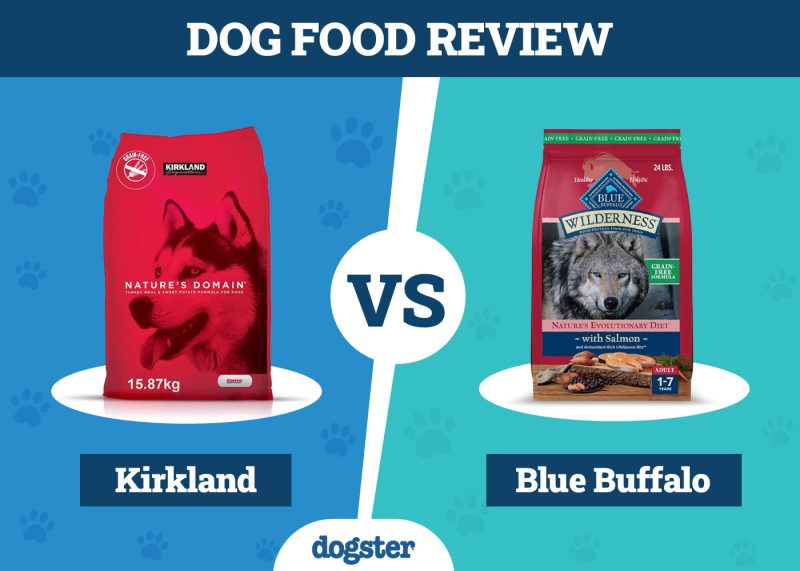In this article
View 2 More +Can dogs even get colds? The answer to this depends on what you call a “cold”. If you’re asking whether they can get infectious respiratory illnesses, the answer is yes they can. If you’re wondering whether your dog suffers from the same viral illness that you have, it’s very unlikely as known canine respiratory viruses will not cause illness in humans and vice versa.
Viruses are usually adapted to a narrow range of species, which means most viruses have a hard time causing disease in both dogs and humans (with Rabies being an unfortunate exception). That being said, if genetic changes to viruses mean they can cause disease in a new host, it can have devastating consequences.1
So, while you don’t typically need to socially distance yourself from your dog when either of you have a cold, you should take steps to identify your dog’s illness and prevent them from infecting other dogs. Our article will list the common signs of colds in dogs, discuss the signs that suggest your dog needs veterinary care, and discuss the rare circumstances where your dog may pass on a respiratory illness to you.

Causes of “Colds” in Dogs
Colds can be caused by a few viruses, and even bacteria, that are spread between dogs. This group of bugs is known as the canine infectious respiratory disease (CIRD) complex. The group is also broadly referred to as “kennel cough” when they cause signs of illness in dogs.
- Canine parainfluenza virus
- Canine adenovirus type 2
- Bordatella bronchispetica
- Canine influenza virus
- Canine respiratory coronavirus
- Canine distemper virus (rare but much much more severe, that can lead to neurological signs and death)
Knowing the cause isn’t usually too important when treating your dog, however, veterinarians can run tests called respiratory panels that detect the DNA of microbes that can be responsible for kennel cough.

The 11 Signs Your Dog Has a “Cold”
1. Potential Exposure
Being exposed to other dogs, or areas where other dogs frequent, is a sign that your dog may have been exposed to an infectious respiratory disease.
- Dog parks
- Competitiions
- Shelters
- Daycare
- Training facilities
- Groomers
- Veterinary clinics
- Public spaces
Dogs that aren’t yet sick can spread the virus, so just because you haven’t had your dog around any coughing dogs doesn’t mean they aren’t infected. Certain microbes are also quite hardy in the environment meaning your dog can pick them up from water bowls, toys, beds, and people’s clothes.

2. Duration of Illness
A usual bout of kennel cough can last for up to 2 weeks before dogs will typically clear the infection on their own. So if your dog has been showing respiratory signs for months and months, you can bet it’s not kennel cough.
When your dog’s signs last longer than expected, even if the signs are mild, you should organize a vet visit. Your pooch may need medication or special care depending on what’s causing their issues.
3. Vaccination History
Vaccinations have been revolutionary in preventing deadly illnesses in people and animals. Core vaccinations will protect your dog from canine distemper virus, canine adenovirus type-2, and canine parainfluenza virus. You can also opt to have your dog vaccinated against canine influenza virus or Bordatella Bronchiseptica.
Follow your vet’s instructions as to when to vaccinate your dog to ensure the best outcomes for them. If your dog is not up to date with vaccinations, they are more likely to have kennel cough. While vaccinated dogs can still get kennel cough, they typically show milder signs, don’t spread it as much, and have a better recovery.

4. Coughing
Coughing is the biggest sign of kennel cough and infected dogs usually have a dry or “goosehonking” cough. However, other diseases like bronchitits or tracheal collapse can mimic this type of cough. If your dog has a wet or productive cough they may have pneumonia (lung infection) secondry to the kennel cough.
They may also never have had kennel cough to begin with, as other problems like congestive heart failure or rat bait toxicity can cause a wet cough; in the case of a wet cough we recommend visiting with a vet. If your dog’s cough is severe with kennel cough you can also see a vet for medication like cough supressants.
If you need to speak with a vet but can't get to one, head over to PangoVet. It's our online service where you can talk to a vet online and get the advice you need for your pet — all at an affordable price!

5. Sneezing
Sneezing can also occur with upper respiratory viruses in dogs. Environmental irritants like dust, pollen, and aerosoles can also cause sneezing. So if sneezing is your dog’s only sign you should see if there’s anything that could be irritating the nose.
Then again your dog might be sneezing because of something stuck in the nose like a grass awn. With nasal foreign bodies, the sneezing just doesn’t stop so you should see a vet for continuous sneezing but also if there are other signs like blood from the nose or noisy breathing.

6. Nasal Discharge
Typically, watery nasal discharge is a sign of kennel cough. This discharge should be fairly mild and not really interfere with your dog breathing from their nose. Thicker yellow discharge can indicate infection in the lungs or nasal cavity.
Blood in the nasal discharge is also concerning and a good reason to visit the vet. Dogs in congestive heart failure with fluid on the lungs can bring up this fluid, potentially leading to foaming at the nose and mouth.
7. Watery Eyes
Infectious respiratory illnesses can cause conjunctivitis and signs of mildly reddened and watery eyes. If your dog’s eye goobers start to turn a yellow color, or the inflammation becomes more severe, they may need eye medications.
If your dog has swollen eyes, discoloration in the eye, is squinting, or paws at their ey,e they might also need some medication and may have an ocular issue other than the mild conjunctivitis we expect.
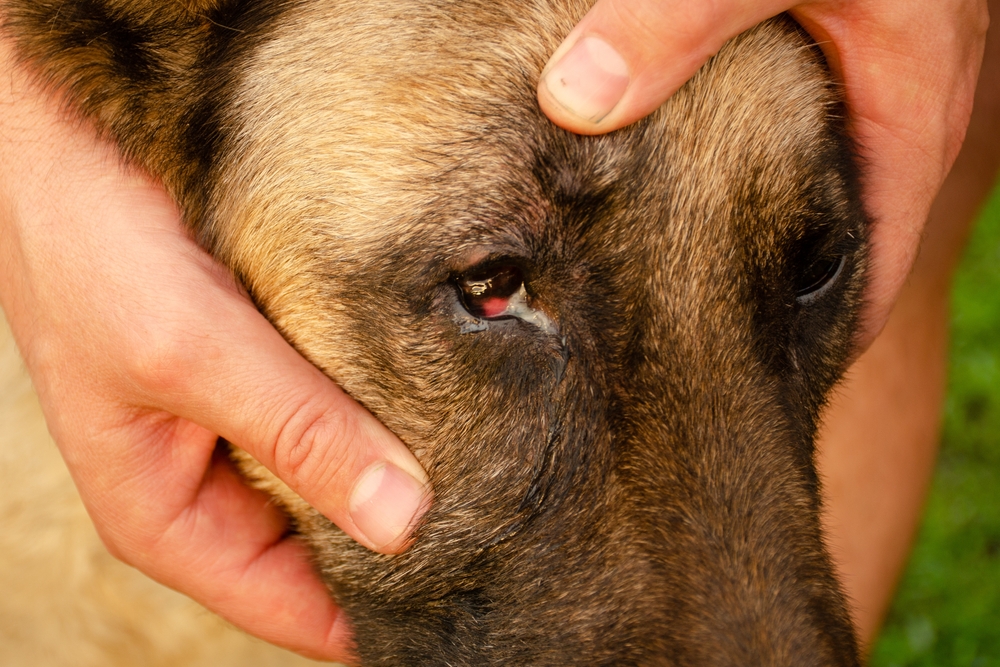
8. Inappetance
Dogs with kennel cough may have a sore throat and the illness can make them eat a little less than usual. They may also have a preference for soft food when they have kennel cough. However, your dog should always be willing to eat something in a day.
If your dog is completely off food, especially if they are normally food-obsessed, this is a more severe sign of kennel cough, or potentially could indicate it’s not even kennel cough at all. If they also don’t want water this can quickly lead to dehydration, so if your pup isn’t taking anything by mouth get them to the vet.
9. Lethargy
Lethargy can be a signs of kennel cough, but like not wanting to eat it falls on the more severe side of clinical signs. It’s acceptable for your dog to be a little less energetic or sleep a bit more as they recover from a virus but you generally don’t notice these minor changes in behavior too much.
If your dog doesn’t want to get up, doesn’t run around as normal, or isn’t excited for things like playtime and walkies their lethargy may indicate something more serious and you should organize a vet visit.
10. Fever
You can take your dog’s temperature at home by following our vet-approved steps. A mildly elevated temperature is a common finding with infectious respiratory illnesses, however, if your dog’s temperature is above 103°F, it is worth contacting your veterinarian for advice as this is considered a fever.
A fever could indicate that your pet needs antibiotics for a respiratory infection. Make sure you don’t take your pet’s temperature when they are stressed or excited as this can elevate their body temperature, making the reading inaccurate.
11. Breathing Difficulties
Breathing difficulties or respiratory distress can occur with severe cases of kennel cough that have developed pneumonia. It can also occur with other severe respiratory diseases, for example, congestive heart failure, aspiration, brachycephalic obstructive airway syndrome, and pleural effusion.
If your pup isn’t getting enough oxygen, they won’t live for very long. This is why you must visit your vet immediately if you notice any sign of breathing difficulties such as using the abdomen to breathe, breathing faster than normal, gasping, and purple/ blue gums.


Zoonotic Respiratory Disease
Zoonotic diseases are those that can spread to people, and the zoonotic respiratory illnesses of dogs are all caused by bacteria. Of these bacteria you may remember Bordatella bronchispetica as a cause of kennel cough. It is the most common pathogen in dogs that can make the jump to humans. However, this is rare and mainly occurs in immunocompromised people, so if you have healthy lungs and immune system, you should be fine. On the other hand, if you are at risk you should ask your doctor and veterinarian for advice tailored to your situation.
Other bacteria like Pasturella multocida, Francisella tularensis, Yersinia pestis, and Coxiella burnetii can cause a respiratory infection in humans but rarely cause respiratory signs in dogs. Tularemia caused by Francisella tularensis can be a concern if there is exposure to ticks or rabbit, hare, or rodent carcasses.

Conclusion
If your dog has mild signs of a cold, it’s possible that they have a case of kennel cough that will go away with rest and good care at home. However, each of the signs on this list can be caused by illnesses other than kennel cough. As well as that, some cases of kennel cough will be severe or progress to pneumonia. This is why in most cases it’s best to get a vet’s opinion about your dog’s condition. In addition to assessing your dog, they can provide any treatment they need, like cough suppressants or antibiotics, and advice on how to care for your dog at home.
Featured Image Credit: Jaromir Chalabala, Shutterstock






